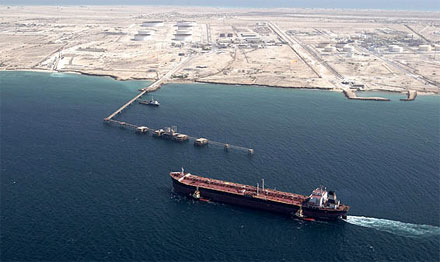
For most of the month of August, U.S. Congress will be on recess. Consider this the calm before the storm.
Most in Washington are aware that September will bring with it the biggest push for Iran sanctions in years. AIPAC has been lobbying for months on the Iran Refined Petroleum Sanctions Act (IRPSA), and on September 10 the Conference of Presidents of Major American Jewish Organizations will kick off a massive nationwide lobbying effort, which they compare to the “Save Darfur” movement. All of this will culminate at the end of the month when, conveniently enough, Mahmoud Ahmadinejad arrives in New York for the UN General Assembly.
Yes, right around the time Ahmadinejad is at the podium in the UN, Congress is expected to impose what it calls “crippling sanctions” on Iran’s economy. The plan is to blockade Iran’s foreign supplies of gasoline, hoping that an increase in the price per gallon at the pump will cause the Iranian people to rise up and demand a halt to Iran’s nuclear program.
But this plan has number of obvious flaws.
First, the Iranian people have already risen up against the government’s hardline leadership. What we have witnessed in Iran for the last two months is unprecedented. To think that marginally higher gas prices will mean anything to a population willing to risk their lives for freedom and democracy is at once naïve and hubristic. According to Juan Cole, imposing broad sanctions on Iran will likely only destroy Iranian civil society and bolster the state’s repressive apparatus–as it did in Iraq.
What’s more, even if the Iranian people were to demand that the government halt its enrichment program–which they wouldn’t, since the vast majority of Iranians support Iran’s right to peaceful nuclear technology–does anyone think that the government will actually go along with it? Has Tehran been particularly responsive to the wishes of its citizens lately? No, in fact, that is what these people are fighting for each and every day: to have their voices heard.
Next, even if the sanctions were effective in harming the Iranian economy, there isn’t a single historical example of economic sanctions translating into a desirable change in the Iranian government’s behavior. Just as the hardliners are resisting their people’s calls for change, so too will they refuse to be seen as capitulating to the demands of the West.
So why is Congress fixated on this idea if it doesn’t stand a chance of stopping the nuclear program? Some would say that the government has to be punished for the brutality with which it has treated its people. Politicians in Washington were universally outraged by the violence against the Iranian people. And for many lawmakers, this was a time to stand up in support of these brave Iranians.
Senator John McCain spoke passionately from the floor of the US Senate, saying: “The United States of America must, and this body must, affirm our support for fundamental human rights of the Iranian people who are being beaten and killed in the streets of Tehran and other cities around Iran. We are with them.”
Republican Mike Pence of Indiana said: “We are bound to support the courageous and decent people in Iran who are struggling for their rights and their freedom.”
And even Minority Whip Eric Cantor spoke up, saying: “We must rally the world around the cause of the Iranian people.”
But now, almost in the same breath, those same lawmakers are calling for “crippling sanctions” on the Iranian economy. They are quick to mention that Iran imports 40% of its refined petroleum, making that industry Iran’s “Achilles heel” so these sanctions will be able to “bring the economy to its knees.”
So much for standing with the Iranian people.
What better way to show our support than by casting the common man into financial ruin? Think about who suffers the most in the US when gas prices rise due to shocks–it’s the poor. Why would it be any different in Iran? Certainly the elite won’t suffer the brunt of these sanctions–the Revolutionary Guards have been getting rich off smuggling sanctioned goods into the country for years. And with Russia and China ready to provide anything the US won’t sell to Iran, the mullahs will surely find a way to fill their gas tanks. So that will just leave the poor and middle class to suffer.
Even neoconservative scholar Fred Kagan has acknowledged the real effect of these petroleum sanctions, saying “Look we need to be honest about this: Iranians are going to die if we impose additional sanctions.” So despite all their lip-service, it seems that Congress’ priorities haven’t changed. They are planning to continue the same failed approach to Iran of the last three decades. To them, these petroleum sanctions made sense before Iran’s election, and miraculously, they are still our best option after the election.
Iran changed forever on June 12. We are now dealing with a completely altered country, and we would be wise to tailor our policies to reflect that reality. Congress should brainstorm some new ideas for how to support the Iranian people and still protect our security and nonproliferation objectives.
To start, they should throw out these sanctions.






